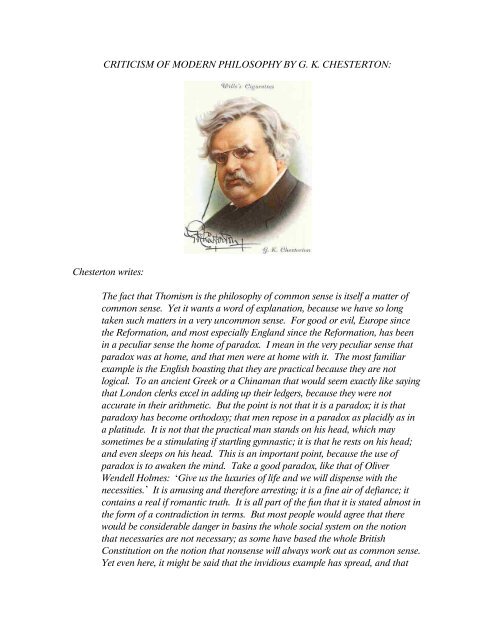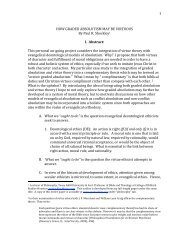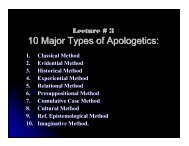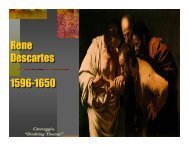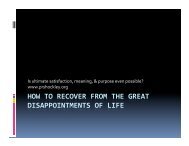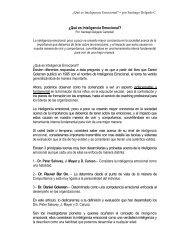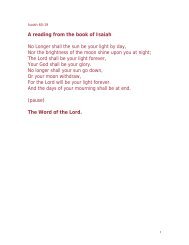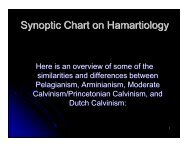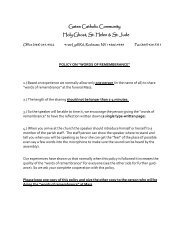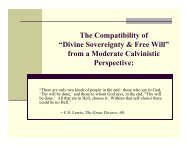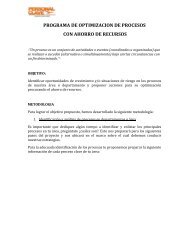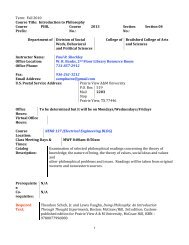Criticism of Modern Philosophy by G K Chesterton
Criticism of Modern Philosophy by G K Chesterton
Criticism of Modern Philosophy by G K Chesterton
Create successful ePaper yourself
Turn your PDF publications into a flip-book with our unique Google optimized e-Paper software.
CRITICISM OF MODERN PHILOSOPHY BY G. K. CHESTERTON:<strong>Chesterton</strong> writes:The fact that Thomism is the philosophy <strong>of</strong> common sense is itself a matter <strong>of</strong>common sense. Yet it wants a word <strong>of</strong> explanation, because we have so longtaken such matters in a very uncommon sense. For good or evil, Europe sincethe Reformation, and most especially England since the Reformation, has beenin a peculiar sense the home <strong>of</strong> paradox. I mean in the very peculiar sense thatparadox was at home, and that men were at home with it. The most familiarexample is the English boasting that they are practical because they are notlogical. To an ancient Greek or a Chinaman that would seem exactly like sayingthat London clerks excel in adding up their ledgers, because they were notaccurate in their arithmetic. But the point is not that it is a paradox; it is thatparadoxy has become orthodoxy; that men repose in a paradox as placidly as ina platitude. It is not that the practical man stands on his head, which maysometimes be a stimulating if startling gymnastic; it is that he rests on his head;and even sleeps on his head. This is an important point, because the use <strong>of</strong>paradox is to awaken the mind. Take a good paradox, like that <strong>of</strong> OliverWendell Holmes: ‘Give us the luxuries <strong>of</strong> life and we will dispense with thenecessities.’ It is amusing and therefore arresting; it is a fine air <strong>of</strong> defiance; itcontains a real if romantic truth. It is all part <strong>of</strong> the fun that it is stated almost inthe form <strong>of</strong> a contradiction in terms. But most people would agree that therewould be considerable danger in basins the whole social system on the notionthat necessaries are not necessary; as some have based the whole BritishConstitution on the notion that nonsense will always work out as common sense.Yet even here, it might be said that the invidious example has spread, and that
the modern industrial system does really say, ‘Give us luxuries like coaltar soap,and we will dispense with necessities like corn.’So much is familiar; but that what is now even realised is that not only thepractical politics, but the abstract philosophies <strong>of</strong> the modern world have hadthis queer twist. Since the modern world began in the sixteenth century, nobody’ssystem <strong>of</strong> philosophy has really corresponded to everybody’s sense <strong>of</strong> reality; itwhat, if left to themselves, common men would call common sense. Eachstarted with a paradox; a peculiar point <strong>of</strong> view demanding a sacrifice <strong>of</strong> whatwould call a peculiar point <strong>of</strong> view demanding the sacrifice <strong>of</strong> what they wouldcall a sane point <strong>of</strong> view. That is the one thing common to Hobbes and Hegel, toKant and Bergson, to Berkeley and William James. A man had to believesomething that no normal man would believe, if it were suddenly propounded tohis simplicity; as that law is above right, or right is outside reason, or things areonly as we think them, or everything is relative to a reality that is not there. Themodern philosopher claims, like a sort <strong>of</strong> confidence man, that if once we willgrant him this, the rest will be easy; he will straighten out the world, if once he isallowed to give this one twist to the mind.It will be understood that in these matters I speak as a fool; or as our democraticcousins would say, a moron; anyhow as a man in the street;...Thomistphilosophy is nearer than most philosophies to the mind <strong>of</strong> the street…. ‘For St.Thomas it is impossible that contradictories should exist together, and againreality and intelligibility correspond, but a thing, must first be, to be intelligible.’…Let the man in the street be forgiven, if he adds that the ‘remarkable difference’seems to him to be that St. Thomas was sane and Hegel was mad. The moronrefuses to admit that Hegel can both exist and not exist; or that it can be possibleto understand Hegel, if there is no Hegel to understand…. And this is what I mean<strong>by</strong> saying that a modern philosophy starts with a stumbling-block. It is surely nottoo much to say that there seems to be a twist, in saying that contraries are notincompatible; or that a things can ‘be’ intelligible and not as yet ‘be’ at all.….Against all this the philosophy <strong>of</strong> St. Thomas stands founded on the universalcommon conviction that eggs are eggs. The Hegelian may say that an egg isreally a hen, because it is a part <strong>of</strong> the endless process <strong>of</strong> Becoming; theBerkeleian may hold that poached eggs only exist as a dream exists; since it isquite as easy to call the dream the cause <strong>of</strong> the eggs as the eggs the cause <strong>of</strong> thedream; the Pragmatist may believe that we get the best out <strong>of</strong> scrambled eggs <strong>by</strong>forgetting that they ever were eggs, and only remembering the scramble. But nopupil <strong>of</strong> St. Thomas needs to addle his brains in order to adequately to addle hiseggs; to put his head at any peculiar angle in looking at eggs, or squinting at eggs,or winking the other eye in order to see a new simplification <strong>of</strong> eggs. The
Thomist stands in the broad daylight <strong>of</strong> the brotherhood <strong>of</strong> men, in theircommon consciousness that eggs are not hens or dreams or mere practicalassumptions; but things attested <strong>by</strong> the Authority <strong>of</strong> the Senses, which is fromGod.Thus, even those who appreciate the metaphysical depth <strong>of</strong> Thomism in othermatters have expressed surprise that he does not deal at all with what many nowthink the main metaphysical question; whether we can prove that the primary act<strong>of</strong> recognition <strong>of</strong> any reality is real. The answer is that St. Thomas recognizedinstantly what so many modern sceptics have begun to suspect rather laboriously;that a man must either answer that question in the affirmative, or else neveranswer any question, never ask any question, never even exist intellectually, toanswer or to ask. I suppose it is true in a sense that a man can be a fundamentalsceptic, but he cannot be anything else; certainly not even a defender <strong>of</strong>fundamental skepticism. If a man feels that all the movements <strong>of</strong> his own mindare meaningless, then his mind is meaningless, and he is meaningless; and itdoes not mean anything to attempt to discover his meaning. Most fundamentalskeptics appear to survive, because they are not consistently sceptical and not atall fundamental. They will first deny everything and then admit something, if forthe sake <strong>of</strong> argument-or <strong>of</strong>ten rather <strong>of</strong> attack without argument. I saw analmost startling example <strong>of</strong> this essential frivolity in the pr<strong>of</strong>essor <strong>of</strong> finalscepticism, in a paper the other day. A man wrote to say that he acceptednothing but Solipsism, and added that he had <strong>of</strong>ten wondered it was not a morecommon philosophy. Now Solipsism simply means that a man believes in hisown existence, but not in anybody or anything else. And it never struck thissimple sophist, that if his philosophy was true, there obviously were no otherphilosophers to pr<strong>of</strong>ess it.To this question ‘I there anything?’ St. Thomas begins <strong>by</strong> answering ‘Yes’ if I hebegan <strong>by</strong> answering ‘No,’ it would not be the beginning, but the end. That is whatsome <strong>of</strong> us call common sense. Either there is no philosophy, no philosophers,no thinkers, no thought, no anything; or else there is a real bridge between themind and reality. But he is actually less exacting than many thinkers, much lessso that most rationalist and materialist thinkers, as to what that first stepinvolves; he is content, as we shall see, to say that it involves the recognition <strong>of</strong>Ens or Being as something definitely beyond our selves. Ens is Ens. Eggs areeggs, and it is not tenable that all eggs were found in a mare’s nest.~ Excerpts from G. K. <strong>Chesterton</strong>’s The Approach to Thomism” in St. ThomasAquinas: “The Dumb Ox” (New York: Doubleday, 1933, 1956), 118-23.


